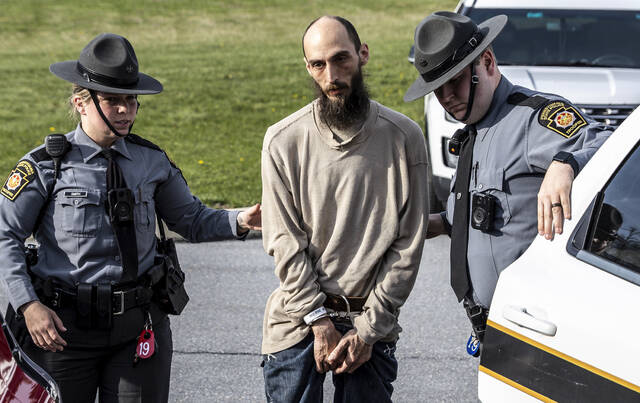When Derek Lee illegally entered a home in Elliott in 2014, he had no intention of killing anyone.
He and his co-defendant, Paul Durham, had gone to the house to rob its occupants.
But while Lee was upstairs, Durham shot and killed a man in the basement.
Both men were arrested, went to trial and were found guilty of second-degree, or felony, murder — which is defined as killing a person during the course of another felony.
In Pennsylvania, that crime calls for a mandatory sentence of life in prison with no chance for parole.
On Tuesday, Lee’s appellate attorney argued to the state Superior Court that such a sentence for a person who did not actually commit the murder and had no intent to take a life, is cruel and unusual punishment, forbidden by both the state and U.S. constitutions.
“Pennsylvania is an extraordinary outlier in imposing life without parole,” said Bret Grote, the legal director of the Abolitionist Law Center, which is representing Lee.
The state ranks second behind only Louisiana in imposing mandatory life without parole for second-degree murder, Grote said. Thirty states forbid such a sentence for that crime.
There are more than 5,000 people serving life without parole in Pennsylvania. About 1,100 of those were convicted of second-degree murder.
“Mr. Lee, lacking an intent to kill, has diminished culpability,” Grote said.
Grote focused much of his argument on Pennsylvania’s Constitution, which prohibits “cruel punishment,” as opposed to the U.S. Constitution, which requires punishment to be both “cruel and unusual” to be prohibited.
“One of the things we struggle with, isn’t this a matter for the legislature?” asked Judge Judith Olson. “Why is this a matter for the courts?”
Grote agreed that the legislature could address the issue, but it has failed to do so — despite related bills being introduced every year for the past five years.
Judge Alice Beck Dubow said she is troubled by the fact that Lee is serving life without parole despite not having pulled the trigger.
“The fact that the legislature has taken all discretion away from the trial court troubles me — in addition to there being no intent,” she said.
Grote agreed, saying that mandatory punishment is contrary to Pennsylvania’s individualized sentencing policy.
Assistant District Attorney Kevin McCarthy said there is discretion built into the system elsewhere — including in how prosecutors negotiate plea deals with defendants — for example, offering a plea to third-degree murder, which does not carry mandatory life.
Further, he said, the fact-finder in a case, whether a jury or judge, also has discretion in reaching their verdict.
“It is not as though everyone charged with murder is facing life without parole,” McCarthy said.
He also told the court that there are additional options available that are being used more often in Pennsylvania, including clemency and commutation.
“It is not theoretical anymore,” he said. “It’s real.”
Grote countered that there are no standards for following those routes, that getting cases considered can take as many as three years, and the process is highly arbitrary.
The Superior Court’s panel of three judges asked several times Tuesday whether they ought to remand the case back to Common Pleas Court to have a hearing on the issues presented.
Grote said he would prefer the court to find outright that the penalty is unconstitutional, but he said he recognized that a more fully developed record would be beneficial to the court.
During his argument, McCarthy said that mandatory life without parole for second-degree murder serves as a deterrent to others.
“If you engage in a serious crime, and someone dies, you will face this punishment,” he said.
Dubow countered, “How can it be a deterrent when they never had any intention of the victim getting killed?”
Senior Judge James Gardner Collins said he thought it was a philosophical issue.
“At what point am I allowed to say it’s a death sentence?” he asked. “It’s philosophical. Is this an issue the courts can deal with or the legislature?”
“I happen to think we can deal with it.”
Betty Lee, whose son Derek Lee is serving a mandatory prison term of life without parole, spoke Tuesday following oral argument in his case before the state Superior Court. pic.twitter.com/FSHNBEveSP
— Paula Reed Ward (@PaulaReedWard) September 20, 2022
Betty Lee, whose son is at the center of the case, said she feels hopeful.
“There’s empathy,” she said. “This isn’t just for my son. It’s for many. I’ve saw the change in my son. I know he’s taken on a lot of responsibility himself rehabilitating himself.”
Grote said after the session that the court’s questions and comments left him feeling encouraged, but that his organization will not stop until what they call “death by incarceration” is ended.
Also Tuesday, hundreds of people were expected at a rally in Harrisburg protesting the practice.
“Our movement is only growing stronger,” Grote said. “Eventually, we are going to strike down this punishment.”
But he added, “We have no illusions it’s going to be easy or fast. “








